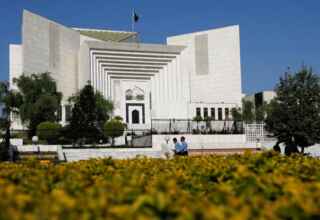
ISLAMABAD, Mar 3 (EW): The government is to introduce structural reforms in federal budget 2023-24, which will also include some additional measures, especially pension reforms, subsidies/ grants and reduction in losses of State Owned Entities (SoEs). This information was shared by Finance Minister Ishaq Dar, during a recent meeting of Federal Cabinet when proposed austerity measures came under consideration.
The Cabinet was informed that work had been initiated on Single Treasury Account, by Finance Division, shall be implemented immediately.
During the discussion majority Members endorsed the proposed austerity measures, while some expressed various concerns. It was pointed out that few of the ministers had no other source of earnings and relied solely on their salaries.
In response, it was informed that the word ‘voluntary’ had been used, so in cases where a minister had no other means of income, an exception could be made by the Prime Minister in a confidential manner.
On a query as to what would be the potential savings from these measures, figures of approximately Rs 70 billion saving in four months and Rs 200 billion annually were given. It was opined by some members that these measures were only symbolic in nature as the financial benefit was not substantial.
The Cabinet was further informed that it could leave an impression in public that salaries and allowances of the ministers, advisers and SAPMs were a major burden on the national exchequer, whereas in reality it was quite to the contrary.
Apprehensions were also expressed on the 15 percent cut in the current expenditure of Ministries/Divisions/Departments, which could negatively impact their performance. Similarly, the desirability of restrictions on foreign travel, especially of the Foreign Office, was also questioned.
Attention was also drawn to some of the measures, such as sale/utilization of official residences above 1000 sq yards in PPP mode, which fell in the domain of the provincial governments. It was, therefore, urged that instead of resorting to measures with optical value, the need of the hour was to undertake painful structural reforms, which were necessary to pave the way for sustainable economic recovery.
In this regard, tax reforms, a durable solution to energy sector challenges, addressing the issue of haemorrhaging SOEs etc. were stressed, besides reducing the size of the Cabinet by half.
Stating that these austerity measures of the government, though symbolic in nature, were necessary to lead by example and show empathy and solidarity with the poor, the Prime Minister asserted that he was strongly in favour of structural reforms and the two were not mutually exclusive.
He expressed his readiness to immediately reduce the size of the Cabinet and informed that he was already consulting the leadership of coalition partners in this regard.
The Minister for Finance drew attention to pare 4 of the summary, which clearly stated that at the time of formulation of budget for FY 2023-24, some additional measures, especially in the field of pension reforms, subsidies/grants and cutting down losses of SOEs would be included. He suggested that the words ‘structural reforms’ could explicitly be added to the Cabinet approval as well.
He further assured that an Austerity Committee was in place to give exemptions in exceptional cases, so the concerns of the members would be adequately addressed. The 15 percent cut on current expenditure could apply only to non-employee related (Non- ERE) expenditure.
He also clarified that the proposed sale/utilization of official residences above 1000 sq yards was not an encroachment on the domain of provincial governments but was restricted to properties owned by the federal government which the provinces may emulate.
The Minister for Finance requested the House that effective date for not allotting more than one plot to public / government servants be changed ‘from March 1, 2023’ to ‘with immediate effect’, so as to dispel any misgivings. In light of the clarifications given, the members were in complete unison that the proposed austerity measures should be adopted.
After detailed discussion, the Cabinet decided that Ministry of Foreign Affairs expenditure on diplomatic mission abroad may not be subjected to 15 percent cut owing to the currency depreciation effect.
It was also decided Finance Division shall include structural reforms among the additional measures to be proposed in the Budget for FY 2023-24.







